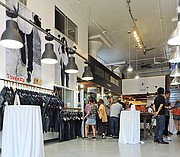Approaching Eco-friendly Denim With Artisan Cloth and Lenzing
Textile
As of Thursday, May 2, 2019
During a recent “Innovation Celebration” event at Artisan Cloth’s downtown Los Angeles showroom, founder Brad Alden Mowry—who co-owns the company with his wife, Danielle—explained that he and his partners were interested not in sales but showcasing their sustainability options.
“My idea was to bring not only a handful of better suppliers but really good people and just have a gathering,” he said. “We really didn’t have an agenda to sell. We just wanted to share what we’re doing and come together.”
The event was co-hosted by Lenzing, the Austrian manufacturer of Tencel, which has been a crucial resource for eco-conscientious apparel manufacturing. To promote transparency that will facilitate greener sourcing for designers, the company has been sharing the stories of its partners. Over the last two years, through its “Carved in Blue” media platform, Lenzing Director of Global Business Development Tricia Carey has made available the stories behind the products.
“Designers want to know what is new, but they need it in a package that is easy for them to adopt,” she said. “They can’t take a lot of time to do all of it. The storytelling is there. Everyone has their own story. Each of these mills has its own story.”
The gathering brought together denim companies and label suppliers, including Mexican denim maker Tavex, Japanese company Kurabo and its partner HW Textiles, and Labeltex, which specializes in branding and packaging.
When discussing Tavex’s LSD, or Laser Sensitive Denim, the company’s director of design, Tony Carnot, revealed how using this process allows the company to choose cleaner manufacturing that bypasses traditional processes, which can harm the environment.
“This is all washed by laser. No wash, no water, no waste,” he said. “It’s a special dye process that we do.”
At Kurabo, Satoshi Toyama, who serves as the company’s apparel and fabrics trade department manager, explained the benefits of the brand’s Aquatic fabric, which was released in Fall 2017.
“We have a new item, Aquatic. It’s a new fabric. It’s like a denim but broken in very well without fading,” he said. “Aquatic is almost the same as piece dyeing.”
At Lenzing, the company adheres to a sourcing process that promotes comfort, performance and sustainability. Central to this effort is adhering to specific sourcing criteria, such as focusing on resources that have natural origins—renewable tree supplies, minimizing the environmental impact from chemicals on water and reducing energy use. While the fiber might shed after customer use, it’s sourced from trees, which means that the microfibers are biodegradable.
“Our new brand launch is ‘Tencel feels so right,’ which we came out with in February,” Carey explained. “We’re highlighting this connection to not only the softness and comfort that you have with Tencel but also it feels so right to do the right thing from a sustainability standpoint.”
Of the 100 million tons of fiber produced worldwide every year, 6 percent comprises the type of manmade cellulosic material produced by Lenzing. The company manufactures 1 million tons of fiber annually, yet Carey wants her partners and customers to know that while the $2 billion company might share a small portion of the textile market, it wants to make a large, positive impact.
“We’re very small in the scheme of things, but we see a high potential for growth,” she said. “A lot of it has to do with sustainability.”
